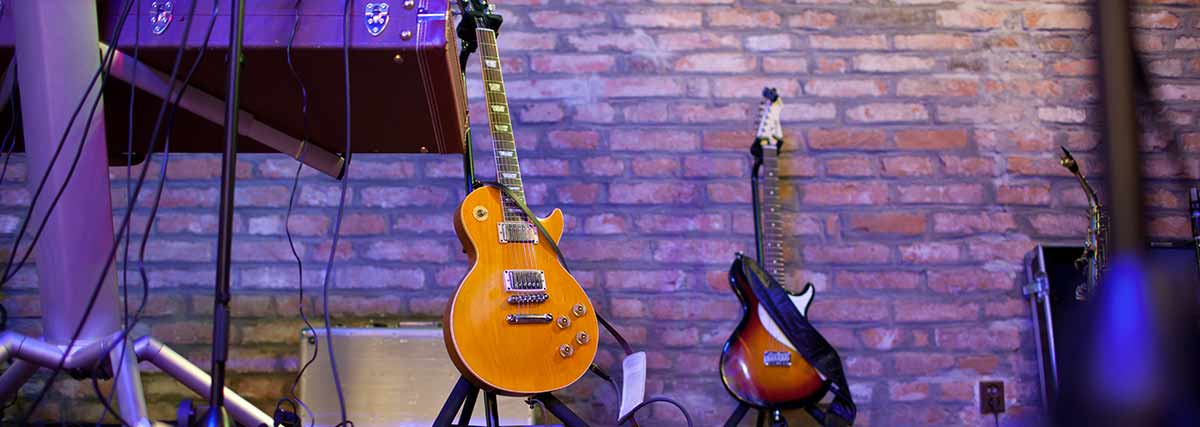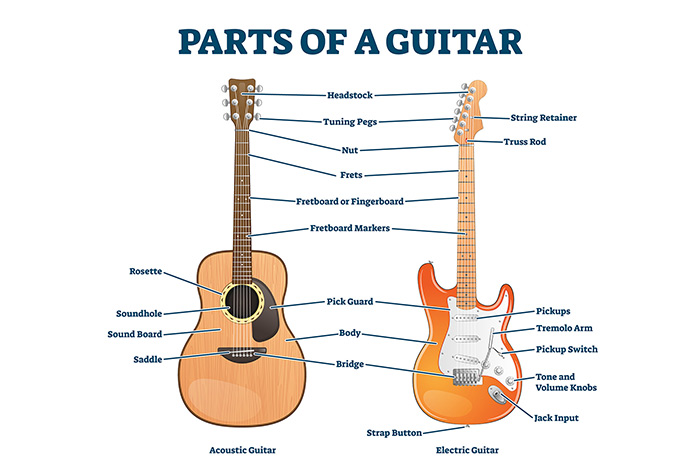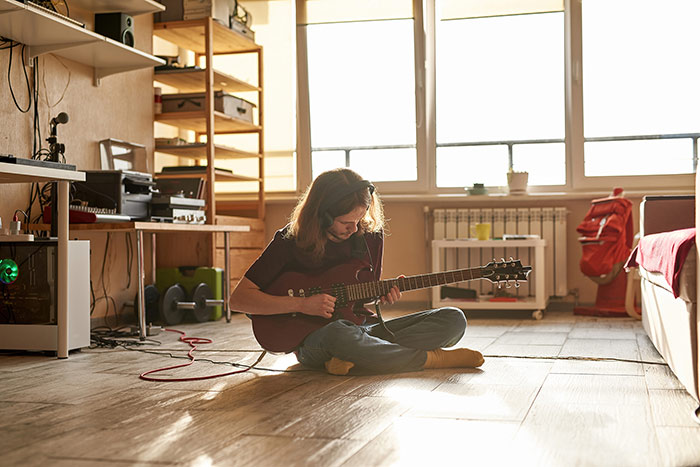Don’t place in direct sunlight
It’s a simple tip, but you would be surprised at how bad direct sunlight can be for an instrument. This is not only the case cosmetically, causing the paint to fade and crack, but also the functionality of the instrument could be altered. Warm temperatures and direct sunlight will result in the strings of the guitar expanding causing them to sound flat or lower than usual, which is not ideal to keeping the instrument sounding consistent.
Not only is direct sunlight bad, but also placing any instrument next to a heater of any sort (radiator, furnace, heating vent, wood fire) will cause a similar problem and in extreme cases can cause the wood to warp which can make the guitar harder to play since it will alter the action (string height). A guitar should be kept in a relatively neutral temperature environment where it won’t be put under any deterioration from the elements.
Although it is great to display your guitar on a stand in your living room for everyone to see, consider placing this somewhere else if you know it won’t be touched for a long period of time to prevent it from being knocked! This may be the case for guitarists with young children (or clumsy friends!). If the guitar sits on the stand for long periods of time this can also cause a buildup of dust in all cavities of the guitar, which can especially become a problem for a guitar with a pickup system which will have an input jack, controls and wiring through the instrument. A buildup of dust in any of these components can cause performance issues with the electronics, so it’s best to leave the guitar in its case if you know it won’t be touched for a while.
Store your guitar properly
There may be times when you know you won’t be touching your guitar for a longer than usual period, perhaps when you are going on holiday or if you are keeping one of your guitars at another location for a while, so it’s important that it is stored properly during this time. Always keep your guitar in its case for this period, as this will help to keep it’s temperature and humidity more consistent and also won’t place it in the way of day to day living where it could be knocked or bumped over! Under a bed or in a wardrobe is a good place to store a guitar in this scenario. Try to avoid garages, sheds or any other environment that could be more susceptible to extreme temperatures in the summer and winter months.
Another great tip for storing your guitars long term is to also place a guitar humidifier into the sound hole to slowly feed it moisture during its time in storage to prevent the wood from drying out too much. D’addario make a great affordable humidifier, which is basically a sponge in a plastic casing that is dampened before placing it in the sound hole.
De-tuning the strings will also be a smart thing to do for longer periods of storage, as this will reduce the amount of stress on the neck of the guitar since the strings are constantly pulling the neck forward. Simply just keep twisting all of the tuners until the string loosens to a point where it is floppy and doesn’t really produce a pitch.
Change strings regularly
All too often students will leave their strings on for far too long, to the point where old rusty guitar strings will actually be making the instrument sound worse and less comfortable to play. This will also make them at risk of the string breaking at an inconvenient time or at the very least going out of tune more often than usual. It is quite likely that the player hasn’t changed their strings because they don’t know how and need someone to show them how to do it, so this can sometimes be a good thing to ask a tutor for a demonstration on. There are also many resources on YouTube for this. Once you complete your first re-string it gets much easier, so don’t keep putting it off! With the new strings on your guitar will resonate much better, be a lot more comfortable to play, and will also have improved tuning stability, so there’s really no reason to not do it!
Use polish
While you’re re-stringing your guitar, it is a good idea once finished to use some polish on the guitar to give it a good clean. Not only will this polish out any ugly fingerprint marks and remove any grease and sweat from use, but will also be great for the woods of the guitar to prevent them from drying out. Lemon oil is also great for this, especially on the fingerboards of the guitar, since I often see students come in with guitars with very dry fingerboards which will again make the instrument less comfortable to play. In extreme cases this can lead to cracks in the wood or finish which could permanently damage the instrument, or at the very least make it not as good as it can be. Polish and lemon oil is cheap and easy to buy from your local music store, so next time you’re in there buying some strings grab a few accessories as well! A decent polishing cloth would pair great with this, and can be used regularly to remove sweat from the guitar which will also help your strings to last longer!
Remove batteries
For acoustic guitars with pickup systems installed, or electric guitars with active pickups, there will be a battery compartment somewhere on the guitar to power the pickup system. This is something that is easy to forget about since they don’t need to be changed all that often, but if a guitar has been stored for a long period of time without being touched old batteries can leak and cause serious damage to the electronics! Did you ever have toys as a kid that were ruined because the batteries leaked in the battery compartment? Or perhaps this has happened to your kids? This same thing can happen to the battery compartment of your guitar if you’re not careful. I would always recommend buying good quality batteries to start with so even if they do die, they’re less likely to leak fluid. Cheap batteries will not last as long and can sometimes affect the sound quality of the pickup itself, so its always best to spend the few extra dollars on good quality batteries.
Tags: Guitar advice, Guitar tips, Guitar wisdom, taking care of guitar









